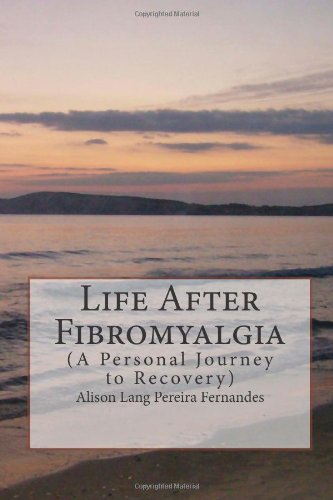Welcome to the latest in our series of occasional guest post. Today Alison Lang Pereira Fernandes tells us about her fibromyalgia story.
Ask anyone with fibromyalgia about their condition and you will almost certainly be painted a depressing and bleak picture about the pain and other unpleasant symptoms which they live with on a daily basis. Statistically, there are over three quarters of a million people in the UK and between 3-6 million in the USA who have the condition. They live with a combination of symptoms which others often find difficult to appreciate or understand and face an almost inevitable loss of quality of life. Many sufferers encounter lack of understanding and sometimes disbelief from people around them, adding to their sense of isolation and hopelessness.
In February 2009 I joined those statistics when I was diagnosed by a consultant rheumatologist with the illness. At that time I had little idea what the implications were of the syndrome or of the way it was to affect my life.
The first major shift came the day after my diagnosis, when my live in boyfriend moved out while I was at work. I was on my own with this, having no family close by; and a very limited circle of friends due to having been overseas for almost ten years, before moving back to the UK to an area I didn’t know.
Despite having been given the impression by the doctors early on that fibromyalgia was a transient condition from which I could expect to recover, I found myself affected by worsening symptoms and a range of medication which, although it had some beneficial effect on the pain, muscle spasms and headaches, had a range of side effects which were harmful to health. Episodes where one or more of my limbs would go into spasms lasting anything up to half an hour were not uncommon; I was almost unable to climb stairs; became dizzy and breathless; unable to concentrate or remember things; had trouble swallowing and sleeping; and could only walk a short distance before my pain levels rose too far and I had to stop to rest. I was sensitive to noise and light and suffered from depression.
By mid-2011 I had lost my job; I had been forced to stop studying for a science degree with the Open University because I was unable to meet the curriculum requirements and had little or no prospect of recovery. I had faced the probability that my fibromyalgia was with me for life; and that the medical profession were apparently unable either to identify the cause of the condition or to offer hope of recovery.
Although I could see no way forward, a part of me refused to give up. If there was a way of curing fibromyalgia I was determined to find it. Throughout my illness I had trawled the internet, chasing every possible clue; none seemed to lead to a definitive path out of my situation. A chance question aimed at my consultant during a hospital appointment gave me something to research. I began to look at the biochemical implications of fibromyalgia and reached a conclusion which led me to change the way in which I treated my illness.
Since New Year 2012, I have been on the road to recovery. I do not say a cure, but I am able to live without medication, thanks to my discovery. Nearly two years later I am virtually symptom and pain free; able to exercise and do many things which I had been unable to while ill; and I want to share what I have found out with others. I have written a short book outlining my journey to recovery in the hope that other people with the condition will find, like I did, that it is possible to regain quality of life, to come off medication and to look forward to the future again. My book is available on CreateSpace in the States and on Amazon in the UK and Europe and is called Life after Fibromyalgia (A Personal Journey to Recovery).

